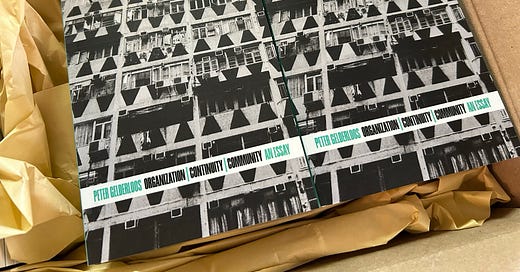Organization, Continuity, Community
strategy and reflection from revolutionary movements over the last 20 years
Over the last two to three decades, anarchist movements the world over have achieved major gains.
When both the Left and the Right decided in the 20th century it was a priority for them to brutally eliminate any cohesive anti-State movement and practice, they slaughtered hundreds of thousands of anarchists from Mexico and the Philippines to Russia, Ukraine, Argentina, Germany, the United States, Korea, Bulgaria, Yugoslavia, Morocco, Spain, Uruguay, Cuba… torturing, deporting, or imprisoning countless others.
After that, anarchists were largely focused on survival—the survival of our ideas and history, survival through prison and exile—or on finding a balance between solidarity, critical participation, and criticism in relation to movements dominated by authoritarian parties.
But at a certain point—depending on where you look in 1991, 1996, 1999, 2008, 2011—anarchists increasingly began to take the initiative and open up new spaces of struggle or rejuvenate old ones. Anarchism was adopted by many traditionally stateless Indigenous movements as an explicit way to name and reject how the Left had historically treated them like cannon fodder, it was the radical position against assimilation both in feminist and in queer and trans spaces, and it was chosen by many veterans and new participants in the Black liberation movement as another way forward, to analyze their experiences, their targets, and errors of the earlier generation.
Anarchism poses the questions that sit at the heart of abolition and of transformative justice, which in their best form are simultaneously goals and practices that have grown up alongside a resurgent anarchism. And anarchism provided both the method and a good deal of the analysis that motivated land defense and other ecological movements, a rekindled global anticapitalism, new iterations of neighborhood and housing struggles, as well towards efforts community health, harm reduction, and mutual aid.
Anarchism and anarchists were essential to the anti-racist, anti-police struggles that heated up and took over entire cities, entire countries for days, weeks, or even months at a time, and these were struggles that began before the Great Recession, contrary to the historiography being plastered over our shared past by the materialists of the day, who are threatened by the fact of how little they have contributed to revolutionary movements in generations…
And yet, so many of these movements came up against hard limits and are no longer dynamic or even visible. Maybe the limit was a level of totalitarian repression they could not counter. In other countries it was a refusal to learn, to subdue egos, to engage in solidaristic analysis of our mistakes—criticism as a practice of love and abundance—that caused movements to stagnate and be led astray by a reformist Left, or distracted by the demoralizing return of authoritarian ideologies (ideologies that could boast resurgent book sales, but not any ability to revitalize lower class struggles or contribute useful methods).
In some places it was already in 2013, 2016, or maybe not until 2020, 2021, but there came a moment where you could look around and not see anyone still holding their head up, or you could just feel that something had been lost and that those who were still carrying on were stuck in a holding pattern, telling themselves lies about what they were doing, ignoring the evidence of their defeat.
It was in that place that I wrote Organization, Continuity, Community, originally in Catalan, on the basis of my experience with what had happened in movements there (an arc that was incendiary, inspiring, and then soul-crushing), while also in dialogue with friends and comrades around the world.
We have to learn from our defeats and mistakes, and that requires examining them. That’s why I encourage all of you to revisit the experiences of the last couple decades, to learn the stories of the sorts of things that happened and how they happened if you’re new to movements for freedom and survival. And if this book can be a useful tool for guiding that exploration and honing an analysis — start a reading group and make the conversation collective.
In Organization, I try to analyze different organizational forms as tools, which means neutrally but not relativistically. So many anarchists have limited themselves by fetishizing one type of organization or another, which takes the better part of strategy off the table. The real question is understanding what each tool does and when we can use it, understanding what weaknesses or dangers each tool presents, and assessing whether we can navigate that danger if we are conscious of it. Understanding that there is no perfect tool is crucial to ascertaining which tools are not just fraught with an intrinsic weakness but actually incompatible with any liberation movement, such as a political party or a hierarchical military, the way an atomic weapon is “just a tool” but clearly one that offers us nothing but grief if what we want is a healthier world.
The next step is to accept that nobody gets to determine the strategies of an entire movement, which means we need to change and develop our organizational forms strategically in relationship to what already exists, to what we hope to accomplish in the immediate present, and how we want to shape our relations with neighbors and with others in struggle, with whom we have variable degrees of affinity, trust, and proximity.
In Continuity, I look at the factors that keep us trapped in an eternal present, committing the same mistakes over and over again, that prevent us from passing on memory and becoming fully intergenerational movements capable of survival.
These include certain colonial ways of understanding individuality, conflict, and care, as well as the colonial Left’s confused renunciation of spirituality.
(This is also a question I’m analyzing in much greater detail—and with plenty of interviews—in my forthcoming book with Pluto Press, They Will Beat the Memory Out of Us.)
And in Community, I argue that most white people or middle class people who talk about communities actually have no idea what a community is, in part because a real community can only exist in a state of war with the Colony, and in part because they have bought into the rationalist concept of individuality so they misunderstand the conditions for their own survival.
It doesn’t help that the historical dogmatism of revolutionaries have made them the foremost butcher of revolutions, given that a true revolution is not the triumph of a unified perspective, it is the flourishing of an uncontrolled, mutually balancing ecosystem. This ecosystemic lens on revolt can also help us understand why the dynamics in so many of our groups so often go awry.
As an additional tool for analysis, Detritus Books has included an English translation of an earlier essay, “Antiauthoritarian Inequality,” a critique of the idea of equality as a rationalist, authoritarian non sequitur that prevents us from asking the real questions necessary for liberation.
Anyway. So much of my movement experiences, analysis, conversations with friends, fights with friends, depression, hope, inspiration, more depression, and then a little bit more hope—really from about 2016 to 2022 and then again as I worked on the translations these last two years—is in these pages.
I don’t want it all to die and disappear. I want it to have served for something. I want all these deaths to become compost. I want to share it with you. I want you to think about it and talk about it. And I’d love for you to support Detritus Books, because of how they pour so much effort not in publishing what they think is going to sell best, but into putting out the books they want to share with the world.
https://detritusbooks.com/products/organization-community-continuity-by-peter-gelderloos
That’s all for now.
Stay loving, stay fierce, get sharper, and let’s all strengthen our relationships and examine our arsenals. There’s a whole lot of survival, a whole lot of rebuilding, and plenty of desperate battles ahead.






Yes, thank you for all your work.
Would love to read the original Catalan version of the book (and any other writings) if they’re accesible.